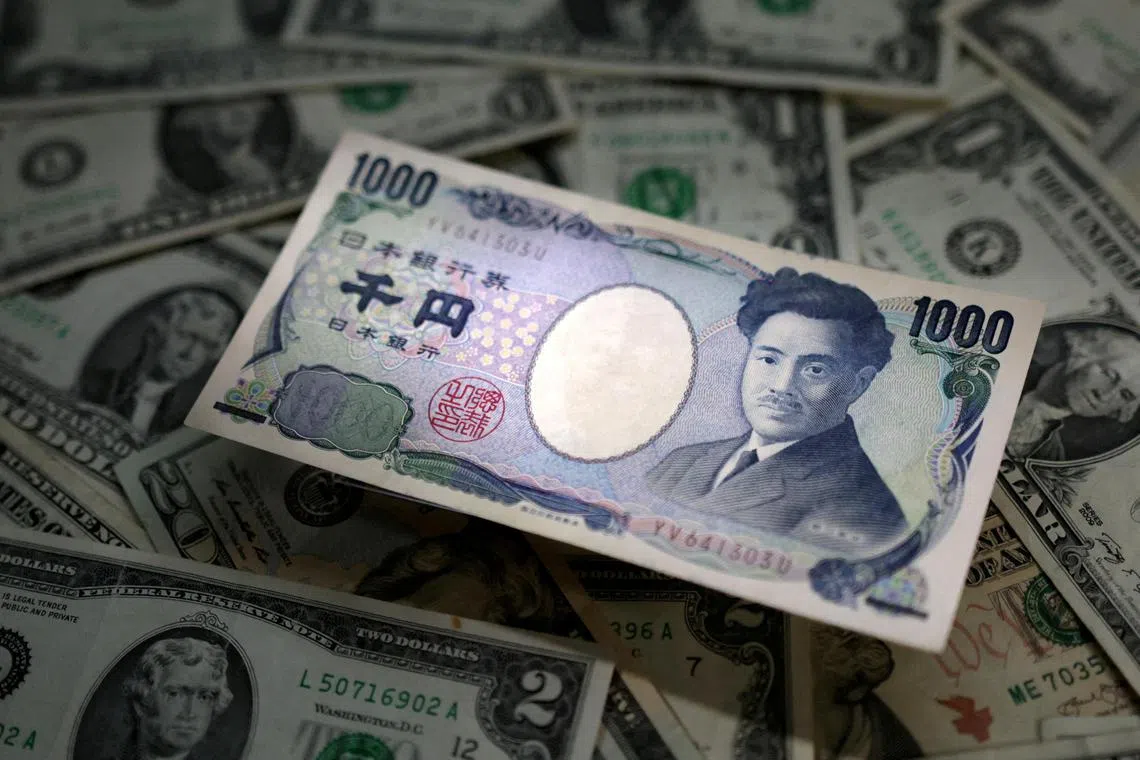Why the yen is so weak and what that means for Japan
Sign up now: Get ST's newsletters delivered to your inbox

The yen’s decline has both benefited and harmed Japan's economy, businesses and consumers.
PHOTO: REUTERS
WASHINGTON – The yen has continued to languish near its historic low versus the US dollar
The downward pressure persists, even after the Bank of Japan (BOJ) raised interest rates earlier this week
The yen’s decline has both benefited and harmed the economy, businesses and consumers. Japanese policymakers remain on guard
Traders will be on high alert when the BOJ releases its policy statement and forecasts around midday on April 26.
“If the yen falls further, for instance dropping by one to two yen a day against the dollar, triggered by an event such as the BOJ’s decision, intervention is very likely,” said Monex bond and currency trader Tsutomu Soma.
“However, if the yen moves in a narrow range like now due to risk of intervention, it’s hard to justify the intervention.”
Here are five questions about the currency and its trajectory.
1. Why is the yen so weak?
The yen has been the worst performer in 2024 among major currencies against the US dollar, falling more than 6 per cent.
That is mainly because of the wide gap in interest rates between Japan and the US. In a historic move, the BOJ this week ended the world’s last negative rate policy with its first hike in 17 years.
Even so, Japan’s new policy rate is by far the lowest in the developed world, at a range of between 0 per cent and 0.1 per cent. Days later, Fed officials left the benchmark federal funds rate
2. Will the yen stay weak or rebound?
That will largely depend on the trajectory of the interest rate gap.
BOJ governor Kazuo Ueda has made it clear that Japan’s overall policy settings will remain accommodative, meaning he is unlikely to raise rates fast or by a lot. With the market predicting the rate gap will stay wide, the yen fell towards its historic low versus the dollar.
The yen rebounded somewhat after Fed chairman Jerome Powell signalled that the US central bank will stick to its plan of cutting rates three times in 2024 despite bumpy inflation. That indicates the rate gap will shrink later in 2024, a development that would support the yen.
3. What does the weak yen mean for the economy?
Generally, a weaker yen helps large Japanese companies with global operations because it increases the value of repatriated overseas profits.
A weak currency can also help the country’s tourism
On the downside, a soft yen makes imports of energy and food more expensive, hitting consumers.
4. What’s next for the BOJ?
Investors and economists are split over whether the BOJ is finished with raising interest rates in 2024 or will make another move.
Mr Ueda said if inflation runs hotter than expected, another rate hike would be on the table. The key point will be whether consumption recovers.
That would make it easy for the BOJ to raise rates again, as it could claim that resilient domestic demand fuelled by wage hikes is making demand-led inflation sustainable. If consumption fails to pick up despite wage growth, the economy will lose momentum, making it hard for the BOJ to justify another hike.
5. Could the government intervene?
The yen fell close to the 152 threshold against the dollar in the wake of the BOJ’s rate hike – within a whisker of its historic low reached in 2022.
Japanese Finance Minister Shunichi Suzuki, who is in charge of currency policy, has been issuing standard verbal warnings meant to put a floor under the yen, but the authorities have not taken direct action in the market. The last time they did so was in 2022, when they intervened multiple times to support the local currency.
US Treasury Secretary Janet Yellen said in 2023 that any intervention by Japan to prop up the yen would be understandable if it were aimed at smoothing out volatility – not at affecting the absolute level of the exchange rate. BLOOMBERG


